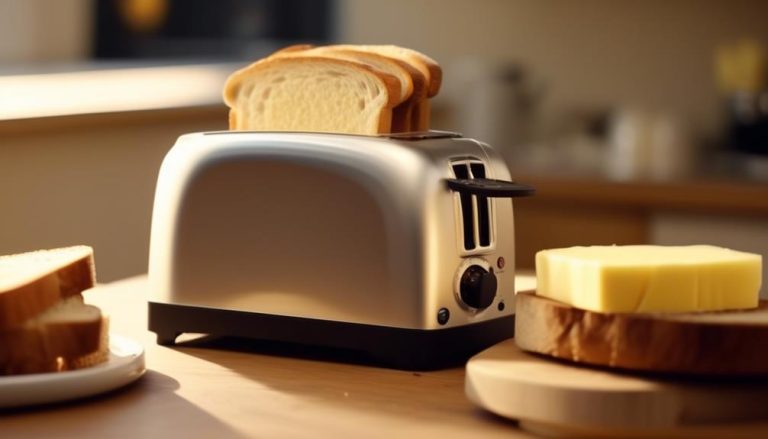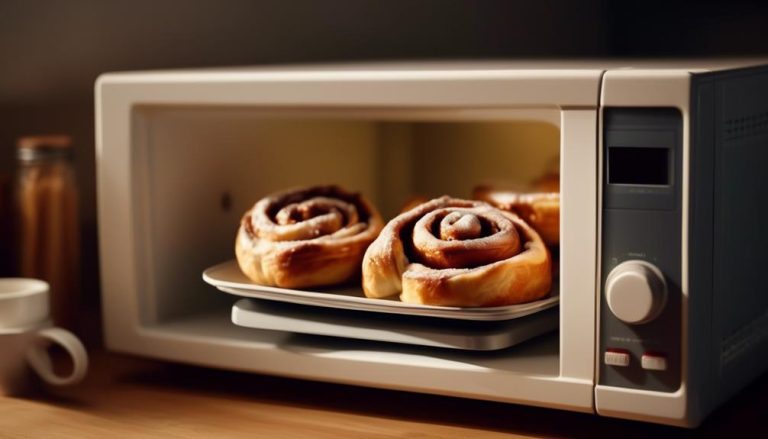Can You Put a Deep Freezer Outside
Is it actually feasible to put a deep freezer outside? You might have pondered this question while strategizing on how to maximize your indoor space.
As a professional, I can assure you there's more than meets the eye when it comes to positioning deep freezers. Environmental factors, brand specifications, and even local wildlife can have a significant impact on the decision and its outcomes.
As we explore this topic, you'll discover why this seemingly simple question might lead you on a surprising journey of home management.
Understanding Deep Freezers

To fully grasp the concept of putting a deep freezer outside, you first need to understand what a deep freezer is and how it functions. A deep freezer, one of the various freezer types, is a standalone appliance designed for long-term storage of perishable items. It's vertically oriented, giving it its 'deep' moniker.
The deep freezer capacity refers to the volume it can hold, measured in cubic feet. It ranges from compact models with about 5 cubic feet of space to larger models exceeding 20 cubic feet. Understanding these aspects is crucial when considering outdoor placement. It's not just about whether it fits your space, but also if it's right for your storage needs and energy usage.
Why Consider an Outdoor Freezer?
Shifting your deep freezer outdoors can free up valuable indoor space and potentially reduce energy consumption, making it a practical choice worth considering.
An outdoor freezer security system can safeguard your appliance from theft or vandalism, providing peace of mind.
It's also vital to conduct a freezer capacity evaluation before you move the appliance. Assessing your food storage needs ensures the outdoor placement doesn't limit your usage or compromise the freezer's efficiency.
Remember, outdoor temperatures can influence your freezer's performance, so consider the climate and the appliance's energy ratings.
The Impact of Climate

While considering the benefits of an outdoor freezer, it's crucial to understand how your local climate can significantly impact its performance and efficiency. In areas with high temperatures, your freezer will work harder to maintain its internal temperature, affecting its longevity and energy consumption. Conversely, extremely cold environments can cause the freezer's components to freeze, leading to potential damage.
Climate resilience is an essential factor in this decision. Your freezer should be capable of withstanding the climate's fluctuations without compromising its performance. Certain models are designed specifically for outdoor use and come with enhanced insulation and robust components for increased climate resilience. This design feature can drastically improve your freezer's longevity.
Ultimately, the success of an outdoor freezer lies in its ability to adapt to and withstand your local climate.
Proper Placement for Freezers
Choosing the right spot for your outdoor freezer is a fundamental step, as factors like sunlight exposure and ground stability can significantly affect its performance and lifespan. Consider these key points:
- Sunlight Exposure: Direct sunlight can overwork your freezer, reducing its lifespan. Find a shady spot for efficient operation.
- Ground Stability: Ensure your freezer is on a flat, stable surface to prevent uneven cooling and potential damage.
- Freezer Capacity: Larger freezers require more space and ventilation. Make sure you've enough room to accommodate your freezer's size.
Risks of Outdoor Deep Freezers

Despite its benefits, placing a deep freezer outdoors comes with certain risks you need to be aware of.
Freezer longevity could be compromised due to fluctuating outdoor temperatures and weather conditions. Exposure to extreme cold or heat can damage the freezer's compressor, reducing its lifespan.
Additionally, humidity can lead to rusting and deterioration of the freezer's exterior.
Outdoor pests pose another threat. Creatures like rats and raccoons can damage insulation and wiring, potentially leading to costly repairs. Moreover, these pests can create unsanitary conditions, impacting the food stored inside your freezer.
To ensure your freezer's longevity and protect it from outdoor pests, consider these risks before deciding to place your freezer outside.
Energy Efficiency Concerns
In addition to the physical risks posed by outdoor environments, you should also consider the potential impacts on your deep freezer's energy efficiency. Extreme temperatures can significantly increase power consumption, leading to higher energy bills. Furthermore, unstable climates may affect freezer durability, thereby shortening its lifespan.
Consider the following points:
- Power consumption: Freezers work harder in hot temperatures, using more energy and resulting in higher electricity costs.
- Freezer durability: Exposure to the elements, such as rain or excessive heat, can damage components and decrease freezer longevity.
- Insulation: A poorly insulated outdoor freezer will struggle to maintain a consistent temperature, further increasing power usage.
Weatherproofing Your Freezer

To safeguard your deep freezer from adverse outdoor conditions, you'll need to weatherproof it effectively. Weatherproofing enhances freezer durability, ensuring robust performance despite environmental challenges.
Start by choosing a location with an overhang or shed to protect your appliance from direct sunlight and rain.
Next, consider waterproofing methods. A waterproof cover is a simple and cost-effective solution. It protects the freezer from moisture, dust, and direct UV rays, extending the appliance's lifespan. Alternatively, you could apply a waterproof sealant to the freezer's exterior, especially around the door and joints.
Lastly, ensure proper insulation and ventilation. This prevents condensation, which can lead to rusting and operational inefficiencies.
Good weatherproofing practices can significantly prolong your freezer's life and maintain its efficiency.
Safety Precautions for Outdoor Freezers
Have you considered the safety precautions necessary for maintaining an outdoor freezer?
An outdoor deep freezer offers convenience but also poses challenges, particularly with theft and pests.
Here are some strategies to help you keep it secure and pest-free:
- Freezer Theft Prevention: Secure your freezer with a heavy-duty lock. Consider installing a security camera or motion sensor light as a deterrent.
- Rodent Proofing Strategies: Encase the power cord in a conduit and place the freezer on a raised platform. This deters rodents from nesting.
- Regular Maintenance and Checks: Regular inspection will detect issues early. Check for signs of intrusion, damage or wear.
These steps ensure your freezer's longevity, reduce potential losses and maintain food safety.
Maintaining an Outdoor Freezer

Keeping your outdoor freezer in top-notch condition involves routine maintenance and a keen eye for potential issues. Regular cleaning is vital for freezer longevity, as debris and dust can clog vents and cause overheating. It's important to check seals for any leaks that can let in warm air, reducing efficiency. If you spot frost build-up, defrost your freezer timely to prevent damage.
Outdoor pests can also affect your freezer's performance. Rodents might chew on cables and insects can clog the system. Therefore, it's important to keep the area around your freezer clean and if necessary, use pest control measures.
Regular inspections can help you catch problems early and ensure your freezer continues to function optimally.
Benefits of Garage Freezers
While maintaining an outdoor freezer requires vigilance, situating your freezer in the garage offers several distinct advantages. Implementing garage organization tips can maximize space, making room for your freezer. Having it inside reduces exposure to harsh weather conditions, which can extend its lifespan, following freezer longevity tips.
Garage freezers offer:
- Efficient space utilization: Applying garage organization tips, you can smartly allocate space for your freezer while keeping a tidy environment.
- Enhanced freezer longevity: Positioned inside, your freezer isn't subject to outdoor weather extremes, which can negatively impact its lifespan.
- Easy accessibility: With a freezer in your garage, you have quick access to frozen goods, perfect for impromptu BBQs or when you need an extra ice cream tub for that hot summer day.
Insulation and Temperature Control

To ensure your deep freezer operates optimally outside, you'll need to pay close attention to insulation and temperature control.
Different freezer types require various insulation materials to effectively preserve the cold inside. Chest freezers, for instance, often utilize foam insulation. It's crucial to ensure the insulation is intact and of high quality.
Remember, your freezer's efficiency can be compromised if it's exposed to extreme temperatures. Therefore, monitor the outdoor temperature and ensure it doesn't exceed the freezer's operating range. Use a reliable thermometer to keep track.
Additionally, some freezers come with temperature controls, allowing you to adjust the internal temperature as needed. If yours doesn't, consider investing in an external thermostat for precise control.
Choosing the Right Outdoor Freezer
When it comes to selecting the perfect outdoor freezer, you've got several factors to consider, including the freezer's type, capacity, energy efficiency, and durability against weather elements.
You should look for an outdoor freezer that's:
- Resilient, to withstand fluctuating temperatures and outdoor pests.
- Energy-efficient, to help you save on electricity bills.
- Spacious, to cater to your storage needs.
Freezer durability is essential, especially if you live in a place with extreme weather conditions. You wouldn't want your food to go bad because your freezer couldn't handle the heat or cold. Additionally, your freezer should be designed to prevent outdoor pests from creeping in.
It's not only about buying a freezer, it's about investing in a solution that meets your outdoor food storage needs.
Professional Installation Advice

After you've picked out the perfect outdoor freezer, it's crucial to get it professionally installed to ensure optimal performance and longevity. Professional installation minimizes the risk of errors that could affect your freezer's efficiency and lifespan.
While considering installation costs, don't shy away from investing in a professional. Warranty considerations also come into play here. If you install the freezer yourself and something goes wrong, the warranty may not cover the damage. However, if a professional does it, the warranty is more likely to stay valid.
They'll also know the proper placement for optimal energy efficiency and longevity. So, weigh the installation costs against potential savings from a longer-lasting, efficiently running freezer. It's a worthwhile investment.
Unexpected Challenges to Anticipate
Navigating the landscape of outdoor freezer maintenance, you might encounter several unexpected challenges that require your attention and immediate resolution. These trials not only affect your freezer's longevity but also carry cost implications.
Some of the prominent issues to anticipate include:
- Environmental elements: Outdoor freezers are exposed to weather variations, which may affect their performance and longevity. Rain, snow, high humidity, and extreme temperatures can damage the freezer.
- Energy efficiency: Outdoor freezers work harder to maintain the required temperature, especially in extreme weather, leading to increased energy consumption and cost implications.
- Pest intrusion: Outdoor settings increase the risk of pests getting into your freezer, which can lead to hygiene and functionality issues.
Understanding these challenges will help you make an informed decision about putting a deep freezer outside.
Final Considerations Before Placement

Before making the final decision to place your deep freezer outside, it's crucial to weigh the potential challenges against the benefits, ensuring you're prepared for any issues that may arise.
Consider the freezer capacity; an outside location might limit the size of the unit you can accommodate. If you typically store large amounts of food, this could be a significant hindrance.
Additionally, think about outdoor aesthetics. Is the freezer going to be an eyesore or can it blend seamlessly with your exterior decor?
Finally, consider the cost of any required modifications to the outdoor space to safely house the freezer.
These are vital considerations that will help you make an informed decision about your freezer's placement.
Conclusion
In conclusion, placing a deep freezer outside is possible, but it's crucial to consider your climate, placement, and potential risks. A suitable outdoor freezer can withstand harsh conditions. Professional installation is advised to ensure safety and efficiency.
Anticipate unexpected challenges like power surges or pests. Weigh your options carefully, and remember, the longevity and performance of your freezer depend on your decisions. Proceed with caution and knowledge for a beneficial outdoor freezer experience.






